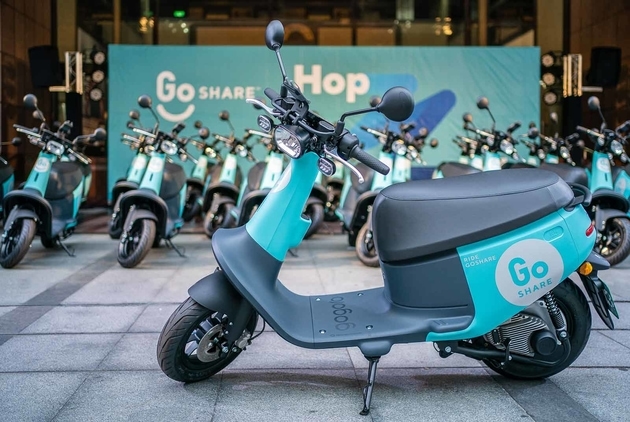Over 10K Shared e-Scooters: Why Is Japan Seeking Knowhow from Taiwan?

Source:GoShare
WeMo and GoShare, the twin pillars of Taiwan’s shared electric scooter service industry, have both announced plans to expand their scope of operations, bringing the number of vehicles placed around Taiwan to over 10,000. Despite getting a head start on shared e-scooter development, all of Europe combined has not yet been able to match Taiwan’s volume of shared vehicles. And this year has seen overseas vendors flocking to Taiwan to glean knowhow and discuss collaborative ventures. What is the key to all of these developments?
Views
Over 10K Shared e-Scooters: Why Is Japan Seeking Knowhow from Taiwan?
By Ching Fang Wuweb only
Taiwan’s electric scooter market really heated up in the second half of this year. GoShare, a venture under the dominant Taiwanese e-scooter brand Gogoro, launched in the city of Taoyuan in August, announcing soon thereafter in October that it would shortly be coming to Taipei as well.
WeMo, the seasoned veteran with three years of operation and nearly 300,000 members, lends out one scooter every 5.7 seconds on average. Looking to leverage its success in the cities of Taipei and New Taipei, WeMo is now expanding to Kaohsiung.
WoMo currently has over 5,000 e-scooters deployed around Taiwan, with plans to place 8,000 electric scooters around Taipei and New Taipei, raising that number to 10,000 by next year. GoShare has deployed around 2,000 e-scooters between Taoyuan and Taipei, with the total number of bikes projected to exceed 4,000 by the year’s end.
Tallying up the numbers, before the year draws to a close, the number of electric motorscooters that can be picked up and dropped off anywhere at any time around Taiwan will cross the 10,000 threshold. This is just the beginning, but as the scope of services continues to grow, consumer complaints about scooter unavailability have not lessened.
Emblematic of the big market pie, 10,000 units is just a small step. “We envision that the shared market can replace three- to five-million private motorcycles,” asserts WeMo CEO Wu Hsin-pei. Wu welcomes the involvement of more competitors, adding, “It’s still too early to talk about competition.”
Target 2020! The Subsidy War Commences
That said, both major startups rolled out special offers at the same time, as if facing off against each other.
With the subsidy war getting hot, Wu Hsin-pei and GoShare’s director of new business, Chiang Chia-wei,have both announced potential partnerships in the works, pointing to the possibility of expansion to overseas markets in the near term.
“Corporations from Japan and Southeast Asia have approached us, and more and more of them are doing so each year,” relates Wu. Most of the entities exploring cooperative opportunities are financial conglomerates or real estate brokers, or automobile leasing agencies thinking of entering the on-demand mobile transportation market. “It (a cooperative venture) might happen next year,” says Wu.
 The emergence of Taiwan’s shared e-scooter market has attracted numerous overseas companies to come to Taiwan seeking wisdom and knowhow. Chiang Chia-wei, director of new business at GoShare, relates that numerous overseas companies have approached his company about cooperative opportunities. (Source: GoShare)
The emergence of Taiwan’s shared e-scooter market has attracted numerous overseas companies to come to Taiwan seeking wisdom and knowhow. Chiang Chia-wei, director of new business at GoShare, relates that numerous overseas companies have approached his company about cooperative opportunities. (Source: GoShare)
At this time, accumulated data on services and its current frontrunner position are the most potent forces backing Taiwan’s export of knowhow. And it is exactly what these countries seek to derive from Taiwan, especially given the intense competition around Taiwan’s e-scooter market, and the inroads manufacturers are making into shared transportation services. However, apart from service models, hardware is a key to overseas expansion.
“They (potential Southeast Asian partners) can only accept around 1,000 Singapore dollars (around NT$20,000) per vehicle, offers Wu Hsin-pei. “Right now no Taiwanese manufacturer can offer electric scooters at that price point,” she adds.
And price is just one factor. Now in business for three years, WeMo CEO Cheng Chieh is often asked why the company regularly purchases the Candy model from Kymco, rather than switching to the more powerful Gogoro or other e-motoscooters.
“Kymco was very conservative in its design of that bike, designing it to last 10 years or more, and making it easy to maintain,” says Cheng Chieh. In other words, the usage rate for shared e-scooters is over three times that of privately-owned bikes. Accordingly, in addition to cost considerations, the durability of service vehicles, and maintenance costs for wear and tear, must be incorporated into the operations model analysis.
As long as the right vehicle model and cooperative approach have been identified, the Taiwanese experience has the chance to establish market supremacy in Southeast Asia.
 WeMo CEO Wu Hsin-pei believes that Taiwan’s shared e-scooter market is just getting started, and that in the future it could replace three to five million privately owned motorcycles and scooters. (Photo by Justin Wu/CW)
WeMo CEO Wu Hsin-pei believes that Taiwan’s shared e-scooter market is just getting started, and that in the future it could replace three to five million privately owned motorcycles and scooters. (Photo by Justin Wu/CW)
Southeast Asian Countries Eager to Implement the Taiwan Experience
Taiwan’s shared electric scooter service is like a late arrival taking over a party. Europe was several years ahead of Taiwan in the development of shared e-scooter services, including Coup, jointly launched in Berlin by Gogoro and Bosch. However, usage rates are disappointingly low.
“In Europe, people ride motorcycles for leisure; in Taiwan and Southeast Asia they use motorcycles to commute,” offers Chiou Yu-Chiun, associate dean of the National Chiao Tung University College of Management.
The combination of a high population density and a sub-tropical climate have shaped Taiwan’s unique motorcycle culture, which is closely aligned with the usage habits in Southeast Asia. The ability to manage e-scooter riding and reduce the emission of pollutants are factors for getting local governments on board, and with their backing promotion can be expected to accelerate.
Lee Chen-yu, director of the Taipei Smart City Program Office, explains that shared services catering to varying travel distances can make up for gaps in the first and final miles inherent in public transportation systems. For instance, bicycles can satisfy the need for trips over very short distances, while e-scooters can resolve the demand for short- and medium-range trips.
Short-range shared motorcycles seemingly compete with privately owned motorcycles for parking space. “But over the long term, they can alleviate stress on public space in cities,” notes Lee. Overseas research indicates as renting or leasing takes the place of buying, one shared vehicle can take the place of nine to 15 private vehicles.
In light of the rapid development of e-scooters, is there a chance we will be seeing electric scooters popular in Europe right here in Taiwan? Lee Chen-yu admits that vendors have approached the Taipei city government expressing their interest in coming to the Taiwanese market, yet between nebulous road usage regulations governing electric scooters and safety concerns, Lee believes they are not right for Taiwan to pursue development.
For the next step, can shared e-scooters be incorporated under set term passes for the MRT system, public buses, and YouBikes? The impediment to this is that shared e-scooter services are furnished by private enterprises, unlike YouBikes, which are operated as public-to-private concessions, thus cooperative arrangements would have to be clarified. Still, this could potentially be a trigger point for the explosive growth of Taiwan’s shared electric scooter empire.
Have you read?
♦ Gogoro Founder: 'Young People Can, They Just Don’t Have The Stage'
♦ E-Mobility Wave Spells the End of Taiwan’s 28,000 Motorcycle Repair Shops
♦ Can Taiwan Become a ‘Digital Island’?
Translated by David Toman
Edited by TC Lin, Sharon Tseng












